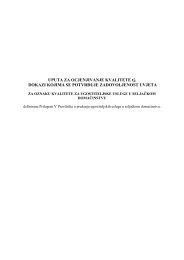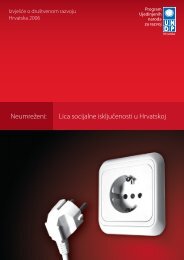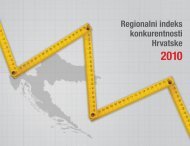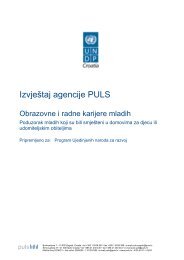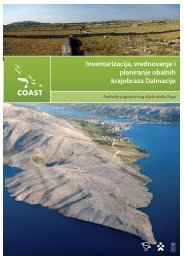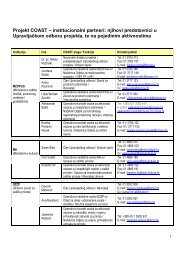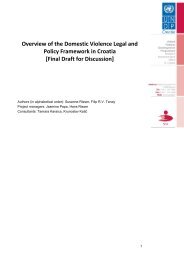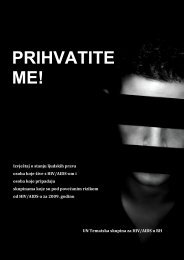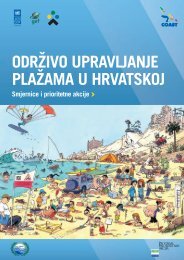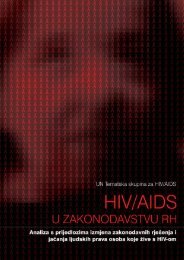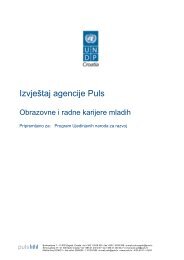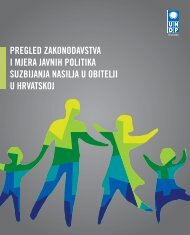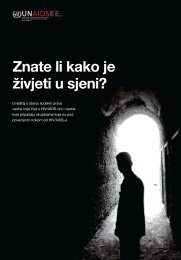WEB engleska verzija end.indd - UNDP Croatia
WEB engleska verzija end.indd - UNDP Croatia
WEB engleska verzija end.indd - UNDP Croatia
- No tags were found...
Create successful ePaper yourself
Turn your PDF publications into a flip-book with our unique Google optimized e-Paper software.
THE SOCIALLY EXCLUDEDCHAPTER 3The people who work in the Association MoSt pointout the complexity of having to take care for individualswho do not have <strong>Croatia</strong>n citizenship or who donot have permanent residence in the county. Thesepeople are mostly unable to return to their originalpermanent residence and frequently do not havepersonal documents or have invalid ones. The AssociationMoSt funds the return to of the originalpermanent residence in almost all cases. The Centrefor Social Welfare may finance the return only whenthe person is the user of some other Centre in theterritory of <strong>Croatia</strong>. In the experience of Split, two outof four foreign citizens return to the Reception Centreafter some time. Of Zagreb’s homeless covered by thesurvey, the majority (87%) have a registered permanentresidence in the City of Zagreb, although thereare quite a few who only have a fictitious registration,so they can realise their social welfare rights.3.12.7 Access to Information andCommunication TechnologyConsidering most homeless are housed in sheltersnot equipped with information and communicationtechnologies, access to the Internet for the purposeof finding employment, obtaining information aboutone’s rights and about possibilities for additionaleducation is not available. In the <strong>Croatia</strong>n EmploymentBureau, several computers are set up for publicuse free of charge, in order to assist in job searchingactivities. However, a certain amount of computerliteracy is still required, and by and large homelesspeople do not have this knowledge. The shelters areequipped with land lines where users of the shelterscan be reached during operating hours and severalusers have mobile phones.3.12.8 Access to Housing and BasicInfrastructureIn <strong>Croatia</strong>, there are six residential facilities int<strong>end</strong>edexclusively for the homeless: the Shelter of the City ofZagreb, the Red Cross Shelter in Zagreb, the ReceptionCentre Caritas Rakitje, the Homeless Centre in Osijek,the Reception Centre for Homeless Men and the ReceptionCentre for Homeless Women in Split. The existingaccommodation capacity in Zagreb is not problematicin view of the number of beds however the problem liesin the quality and content of accommodation, especiallyin the Red Cross Shelter, which is foreseen for demolitionon the grounds of inadequate hygienic and technicalconditions. In order to secure adequate accommodationfor people who need longer-term stays in an institution,the City of Zagreb has equipped an already existingfacility in Kosnica with an 80-bed capacity.A big problem in planning and procuring accommodationcapacities lies in the fact that the Ordinance of theMinistry of Health and Social Welfare does not prescribethe conditions relating to space, human resources, hygiene,and other conditions, which should be imposedon an institution (shelter) accommodating the homeless.As a result, the current facilities are not regulated by law.The shelter in Split enables other users, such as peoplewho live in apartments without a toilet and shower, toalso maintain their personal hygiene there, since Splitdoes not have a public bathroom.3.12.9 Social TiesOnly 8% of the homeless interviewed in Zagreb in2002 are married, with the same percentage living inan extramarital union. Forty-three percent of intervieweeshave never married, 34% are divorced, and4% were widowed. Slightly over one half of intervieweesused to live in a two-parent family. About 40% ofthe primary families of interviewees lived withouta home of their own, frequently changing places ofresidence. Over 60% of interviewees grade the materialand housing conditions of their primary family aspoor, and about one half of them evaluate family relationswithin the primary family as bad. Only one-fifthof interviewees had minor children, who lived mostlywith the other parent and to a lesser extent with relatives,in an institution, or with a foster family.The focus groups discussions in 2006 in Zagreb andSplit showed that most homeless people have losttheir social network. Fri<strong>end</strong>s offer help or temporaryaccommodation in the initial phases of their troubles,but with the passing of time and without any realisticchances of finding a job or other solution, links withfri<strong>end</strong>s and colleagues wane. The homeless find thatit is difficult to be fri<strong>end</strong>s with people who are not inthe same situation as themselves. However, all of thepeople who participated in the focus group in Zagrebcomplained that at places such as shelters relationsbetween people are hostile; there is no solidarity,there are too many problems, too much despair andfrustration. Many feel it is easier to talk to a complete109



